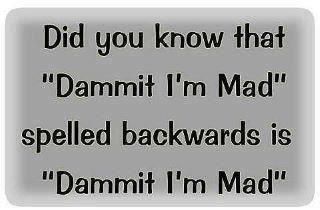Language has a magical way of playing tricks on our minds, and palindromes are a prime example of this. These symmetrical wonders are words, phrases, or numbers that read the same forward and backward. From simple everyday words to elaborate phrases, palindromes show us the playful side of language. In this article, we’ll explore 15 of the funniest and most interesting palindrome examples, while diving into the curious world of word symmetry. Let’s jump into the linguistic fun and uncover some brain-twisting palindromes that are sure to make you laugh!
Thank you for reading this post, don't forget to subscribe!What Is a Palindrome?
Before we dive into the examples, let’s define what a palindrome is. A palindrome is a word, number, phrase, or sequence of characters that reads the same both forward and backward. The simplest form of palindromes is single words like “madam” or “level.” But when it comes to phrases, they can become a bit more elaborate and clever, adding a dash of humor or intrigue.
The beauty of palindromes lies in their simplicity and symmetry, but they can also be complex and fascinating. Their structure forces us to see words in a whole new way, and the best ones often carry an element of surprise. Imagine, words flipping themselves like acrobats!

15 Funny and Interesting Palindrome Examples
1. “A man, a plan, a canal: Panama!”
This famous palindrome takes the cake as one of the most well-known in the world. It’s a historical adventure in a sentence—depicting the planning of the Panama Canal—but, what makes it even better is that it reads the same backward. Who knew international infrastructure could be so symmetrical?
2. “Madam, in Eden, I’m Adam.”
Adam’s opening line to Eve, perhaps? This palindrome has a biblical flair, imagining Adam introducing himself in the Garden of Eden. The balance in the sentence mimics the supposed balance of life in Eden—perfectly symmetrical and peaceful.
3. “Evil is a name of a foeman, as I live.”
A poetic, almost sinister palindrome that conjures the image of an eternal struggle between good and evil. It’s as though even in reverse, the battle rages on. Imagine a villain announcing their own name backwards and forwards—equally menacing both ways!
4. “Mr. Owl ate my metal worm.”
Now, here’s a quirky visual! Picture a steampunk owl snacking on a metallic worm in this delightful and funny palindrome. The image alone of a wise, yet somehow mechanical owl eating a metal worm is enough to spark laughter, and the perfect symmetry of the sentence is the cherry on top.
5. “Was it a car or a cat I saw?”
This classic palindrome leaves us all wondering the same thing: did you really see a car or was it just a cat? It’s the kind of sentence that prompts you to squint into the distance in confusion, while also marveling at its linguistic elegance.
6. “Yo, banana boy!”
This palindrome brings a burst of fruity fun! Imagine a boy who loves bananas so much that even his greeting reflects his obsession. Whether he’s eating them or juggling them, “Yo, banana boy!” sounds like the kind of zany phrase you’d shout across the playground.
7. “Do geese see God?”
This philosophical palindrome ponders the deeper questions of life. It’s not just humans who are curious, apparently—geese are, too! While the image of a group of geese contemplating the divine is amusing, the perfect symmetry of the sentence adds an extra layer of delight.
8. “Able was I ere I saw Elba.”
Napoleon might have been reflecting on his downfall with this palindrome, referring to his exile on the island of Elba. This historically rich palindrome is both poetic and tragic, as it conjures up images of the emperor’s regrets. But there’s something funny about imagining Napoleon sitting in his tent, rearranging words for symmetry.
9. “Taco cat”
Everyone’s favorite meme-worthy palindrome, “taco cat” is simple, silly, and perfect. The mental image of a fluffy cat lounging inside a taco shell is guaranteed to bring a smile to anyone’s face. It’s no wonder this palindrome has become an internet sensation!
10. “Go hang a salami, I’m a lasagna hog.”
This one is pure culinary madness. Not only is it a hilarious palindrome, but the mental image of someone hogging lasagna and hanging salami brings a chaotic kitchen scene to life. It’s a food lover’s palindrome dream!
11. “Never odd or even.”
This palindrome plays with the concepts of odd and even numbers, and how they relate to each other. It’s the kind of sentence that mathematicians might appreciate on a deeper level, but for the rest of us, it’s just a clever play on symmetry.
12. “No lemon, no melon.”
Here’s a fruity palindrome that leaves you wondering—did you want a lemon or a melon? The balance of this phrase makes it almost meditative, while the image of someone denying both a lemon and a melon is oddly satisfying.
13. “Sir, I demand, I am a maid named Iris.”
In this funny palindrome, we’re introduced to Iris, a maid making her case in reverse! The name symmetry and wordplay add a dash of drama to this imaginative little sentence.
14. “Doc, note, I dissent. A fast never prevents a fatness. I diet on cod.”
This lengthy palindrome tells the tale of someone protesting a fast, insisting that no matter how they try, a fast never prevents getting fat. The humor comes from the earnestness of the statement, all while being perfectly symmetrical. It’s a palindrome that speaks to anyone who’s ever struggled with dieting!
15. “Rats live on no evil star.”
A cosmic palindrome that sounds like the tagline of a sci-fi movie. The phrase invokes a dystopian universe where rats have the last word on which celestial bodies harbor evil. It’s the kind of bizarre, symmetrical sentence that sticks with you long after you’ve read it.

Why Palindromes Are So Funny and Fascinating
Palindromes have an inherent charm that makes them both funny and intellectually satisfying. Here’s why:
- Symmetry: We naturally love symmetry. It’s pleasing to the eye and the mind, and palindromes give us that satisfying balance in written form.
- Wordplay: Palindromes are a form of word puzzle, and the cleverness of creating sentences that work both ways adds an element of surprise and fun.
- Unexpected Imagery: Funny palindromes, like “Taco cat” or “Go hang a salami, I’m a lasagna hog,” paint ridiculous and unexpected pictures that catch us off guard. The humor comes from imagining these impossible situations.
- Historical and Poetic Appeal: Some palindromes, like “Able was I ere I saw Elba,” carry a poetic and even historical weight, proving that word symmetry can be both humorous and profound.
How to Create Your Own Funny Palindromes
Making your own palindromes can be a fun and rewarding challenge. Here’s how to get started:
- Start with Simple Words: Begin by experimenting with short, palindromic words like “wow” or “pop.”
- Build a Phrase Around Symmetry: Try expanding to phrases by reversing common sentence patterns. Use words that can easily be flipped, such as “madam,” “racecar,” or “level.”
- Use Your Imagination: The funniest palindromes often paint ridiculous scenarios. Don’t be afraid to get creative and think outside the box. Imagine a scene or dialogue and work backward from that.
- Test for Symmetry: Once you think you’ve got a palindrome, write it out backward to make sure it works. Some of the funniest palindromes are the ones that sneak up on you with their surprising symmetry.
Read Also: Why We Love Cursing and Swear Words
Discover The Origin of the English Alphabet: How Its Smallest Elements Tell the Story
What’s the longest palindrome in the English language?
The longest palindromic word in English is “tattarrattat,” coined by James Joyce in Ulysses to describe a knock on the door. It’s 12 letters long!
Are palindromes only in English?
No! Palindromes exist in many languages, including Latin, Spanish, and Japanese. Each language has its own unique palindromes based on word structure and grammar.
What’s the shortest palindrome?
The shortest palindrome is a single letter: “A.” It’s the simplest example of symmetry, though other short palindromes include “I” and “O.”
Why are palindromes important?
Palindromes are fun linguistic puzzles, but they also have a deeper significance in math, computer science, and literature. Their symmetry can be used in various problem-solving techniques.
Can numbers be palindromes too?
Absolutely! Numbers like 121 or 1331 are examples of palindromic numbers. The concept of symmetry applies to numbers just as it does to words.
What makes palindromes funny?
Palindromes often become funny when they form strange or unexpected sentences, creating absurd or playful images in the reader’s mind. Humor often arises from the unexpected nature of the wordplay.







